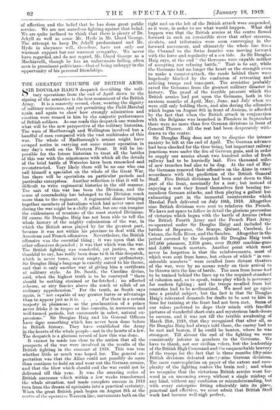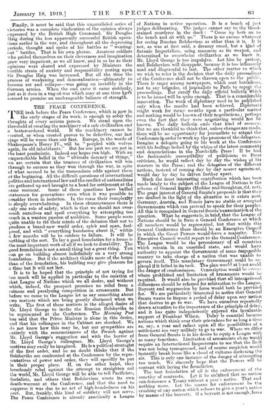THE GREATEST TRIUMPH OF BRITISH ARMS. QIR DOUGLAS HAIG'S despatch
describing the THE GREATEST TRIUMPH OF BRITISH ARMS. QIR DOUGLAS HAIG'S despatch describing the
tart' operations from the end of April down to the signing of the armistice is the best monument of the British Army. It is a masterly record, clear, wearing the dignity of military reticence, and yet permitting the Field-Marshal again and again to show how strongly admiration and emotion were roused in him by the majestic performance of British soldiers. As one reads this despatch one wonders what will be the new perspective of the military historian. The wars of Marlborough and Wellington involved but a handful of men compared with the vast multitudes of this war. The whole of Marlborough's armies might have escaped notice in carrying out some minor operation in any day's work on the Western Front. It will be im- possible for the future historian to treat all the battles of this war with the minuteness with which all the details of the brief battle of Waterloo have been ransacked and reconstructed. Very likely there will be no one who can call himself a specialist on the whole of the Great War, but there will be specialists on particular periods and particular enterprises. Another reflection is that it will be difficult to write regimental histories in the old manner. The unit of this war has been the Division, and the sense of comradeship has belonged to the Division much more than to the regiment. A regimental dinner bringing together members of battalions which had never once met during the war might be a chilly affair, but one can imagine the enthusiasm of reunions of the most storied Divisions. Of course Sir Douglas Haig has not been able to tell the whole history of the mighty culmination of the war, in which the British arms played by far the greatest part, because it was not within his province to deal with the American and French offensives. Nevertheless, the British offensive was the essential thing ; it was upon that the other offensives depended ; it was that which won the war. The British fighting was wonderful, yet justice, we are thankful to say, has really been done to it in this despatch, which is never tame, never empty, never perfunctory. Sir Douglas Haig's language is exactly suited to his theme, and that is only another way of giving him a certificate of military style. As Dr. South, the Caroline divine, said, when the highest truth is to be conveyed " there should be nothing strained or far-fetched ; no affected scheme, or airy fancies above the reach or relish of an ordinary apprehension." For the truth, as South says again, is " not capable of any greater lustre or advantage than to appear just as it is. . . . For there is a certain majesty in plainness ; as the proclamation of a prince never frisks it in tropes or fine conceits, in numerous and well-turned periods, but commands in sober, natural ex- pressions." Sir Douglas Haig and his General Officers have thane something which has never been done before in British history. They have established the Army in the hearts of the whole people—not in the hearts of a few. The despatch is a glorious record of how this was done. It cannot be made too clear to the nation that all the prospects of the war were involved in the results of the British fighting, in the summer of 1918. This was true whether little or much was hoped for. The general ex- pectation was that the Allies could not possibly do more than continue to hold on and wear out the German armies, and that the blow which should end the war could not be delivered till this year. It was the amazing series of British successes which within a few weeks transformed the whole situation, and made complete success in 1918 turn from the dream of optimists into a practical certainty. When the great British push began on August 8th at the centre of the operative Western line, movements both on the
right and on the left of the British attack were suspended, as it were, in order to see what would happen. What did happen was that the British armies at the centre flowed
forward in such an irresistible river that other streams, rivulets, and tributaries were soon converging in the
forward movement, and ultimately the whole line from the Channel to the Swiss frontier was moving forward with the force and regularity of a sea tide. As Sir Douglas Haig says, at the end " the Germans were capable neither of accepting nor refusing battle." That is to say, while the Germans had no longer the heart or the strength even to make a counter-attack, the roads behind them were hopelessly blocked by the confusion of retreating and arriving troops and transport. The armistice probably saved the Germans from the greatest military disaster in history. The proof of the terrible pressure which the British armies had put upon the Germans, both in the anxious months of April, May, June, and July when we were still only holding them, and also during the offensive which began on August 8th in front of Amiens, is afforded by the fact that when the British attack in conjunction with the Belgians was launched in Flanders in September there were no more than five German divisions in front of General Plainer. All the rest had been desperately with- drawn to the centre.
Sir Douglas Haig does not try to disguise the intense anxiety he felt at the end of April. The German advance had been checked for the time being, but important railway junctions.were under the fire of German guns, and in order to supply our armies about two hundred miles of fresh railway had to be hurriedly laid. Five thousand. miles of new trenches had also to be dug. At the end of May the Germans renewed their offensive on the Aisne in exact accordance with the prediction of the British General Staff. Five British divisions had been sent down to this part of the front, nominally for a rest ; but instead of enjoying a rest they found themselves first bearing tre- mendous German attacks, and then playing a gallant but exhausting part in the immortal counterstroke which Marshal Foch delivered on July 18th, 1918. Altogether nine British divisions were sent to reinforce the French. We have not space to follow in detail the glorious procession of victories which began with the battle of Amiens (when the British Fourth Army and the French First Army co-operated under Sir Douglas Haig) and included the battles of Bapaume, the Scarpe, Queant, Cambrai, Le Cateau, the Belle River, and the Sambre. Altogether in the period covered by the despatch Sir Douglas Haig • took 187,000 prisoners, 2,850 guns, over 29,000 machine-guns and 3,000 trench mortars. Another point which must never be forgotten is that the reinforcements, most of which were sent from home, but others of which " in con- siderable numbers " were recalled from distant theatres of the war, were by no means ready on their arrival to be thrown into the line of battle. The men from home had to be trained behind the lines up to the required standard of cohesion and, so to speak, team-play which is necessary for modern fighting ; and the troops recalled from hot countries had to be acclimatized. We need not go again into a painful subject, but the fact is that Sir Douglas Haig's reiterated demands for drafts to be sent to him in time for training at the front had not been met. Some of our rulers preferred to dope their- minds with fanciful pictures of wonderful short-cuts and mysterious back-doors to success, and it was not till the terrible awakening of March 21st, 1918, that they recognized that after all, as Sir Douglas Haig had always told them, the enemy had to be met and beaten, if he could be-beaten, where he was strongest. Till almost the end of- the fighting we were consistently inferior in numbers to the Germans. We have to thank, not our civilian rulers, but the leadership of the British High Command and the unquenchable bravery of the troops for the fact that in three months fifty-nine British divisions defeated ninsty-nine German divisions. The mere contemplation on paper of the extent and com- plexity of the fighting makes the brain reel ; and when we recognize that the victorious British armies went for- ward in an unceasing sweep without a single mishap of any kind, without any confusion or misunderstanding, but with every enterprise fitting admirably into its place, punctual and effective, we must admit that British Staff work had become well-nigh perfect.
Finally, it must be said that this unparalleled series of victories was a complete vindication of the opinion always expressed by the British High Command. Sir Douglas Haig during the less apparently successful British opera- tions earlier in the war, and throughout all the depressing periods, thought and spoke of his battles as " wearing- out " battles. That is his own phrase. Amateur soldiers who prided themselves on their cleverness and imagination grew very impatient, as we all know, and in so far as their opinions were shared and expressed by Ministers the terrible strain of anxiety and responsibility resting upon Sir Douglas Haig was increased. But all the time the process of weakening and demoralization—ultimately to become rot and collapse—was going on invisibly in the German armies. When the end came it came sucidenlYr just as it does in a tug-of-war which may at one time hafe seemed to promise an unchangeable balance of strength.



































 Previous page
Previous page